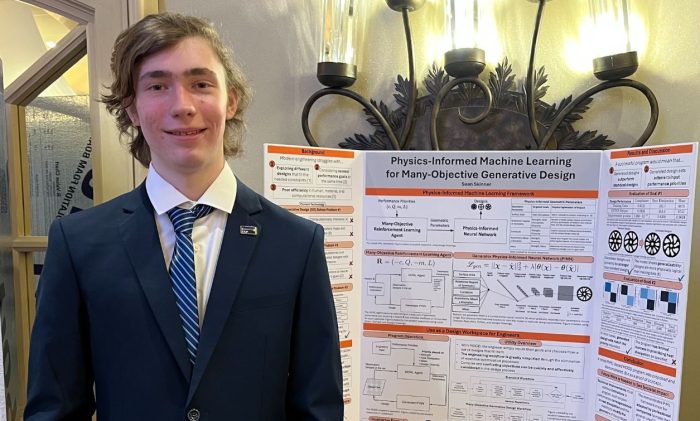By Peter Sloniewsky
Last month, Ward Melville High School student Sean Skinner won a $12,000 scholarship in the engineering and technology category at the National Junior Science and Humanities Symposium in Chantilly, Virginia. The JSHS is a STEM education program intended to encourage high school students to conduct original research in competitions with potential to win scholarships sponsored by the Department of Defense and administered by the National Science Teaching Association. Skinner was one of nine winners of top prizes at the competition.
The JSHS is a multiround competition which begins at the regional symposium, where Skinner began at the New York-Long Island level. There are three total regions in New York State. Skinner placed second in regional semifinals and first overall in regional finals before eventually winning at nationals. The competition is based on 12-minute oral presentations alongside a question-and-answer period.
For his project, Physics-Informed Machine Learning for Many-Objective Generative Design, Skinner created a unique artificial intelligence model intended to assist engineers in designing mechanical structures with less restraints on changeable components.
“The problem is that right now, unlike ChatGPT, you can’t ask [AI used for generating engineering designs] for many goals — you can’t say make it strong and aesthetic and dissipate heat, or whatever else you want; you can really only ask for strong and lightweight,” Skinner wrote in an email. “My project is about fixing that problem.”
Skinner said his project had potential to drastically expand and expedite the possibilities for engineers’ design processes.
“Generative AI can be used to create designs that meet the engineers’ goals better — like being stronger — and to do this designing quickly and more easily,” Skinner. “Rather than drawing everything by hand and then running several layers of computer optimizations, generative AI like my program simply takes in the goals of the engineers and creates possible solutions.”
Moreover, as a current WMHS student and graduating senior, Skinner credited support from Ward Melville programs in helping him to go above and beyond regular coursework to study generative AI.
“Last year I created a more simple generative design research project, which gave me a lot of experience. Of course, before that, I had no specific experience in generative design — it’s not something taught in classes, or even used in most engineering firms at the moment,” Skinner clarified. This may be due to lack of AI knowledge in the engineering subject area, with major implications that AI relies on high-quality and consistent data, which can be challenging to manage in engineering firms due to fragmented sources, inconsistent standards and potential human errors.
Insufficient or low-quality data can also hinder effective AI implementation and lead to biased or inaccurate results — but Skinner is determined to thwart these issues. He reflects, “Building devices for activities at Ward Melville like Science Olympiad has helped me develop a passion and intuition for engineering. With Science Olympiad, I’ve built all sorts of engineering projects… and this allowed me to develop a sense of what I’m capable of as an engineer, how engineering works and what engineers need.”
Next year, Skinner intends to study aerospace engineering at the Georgia Institute of Technology and aspires to eventually pursue a master’s degree in the same subject.
“My dream is to one day work for NASA and help build spacecraft for scientific exploration,” Skinner. “I would love to publish my generative design research one day and to do further research in this field to help it move from a prototype to the industry standard. But as I specialize within my education, I do plan to move closer toward aerospace research, possibly using my computational engineering background.”
Skinner closed his interview with some parting advice for younger students interested in doing independent research.
“I’d say the most important component to being successful is just being passionate,” Skinner said. “If you work as hard as you can for what you’re passionate about, you really can’t go wrong — whether or not your work actually comes together to be flashy or materially successful, there will definitely be some benefit, be it inspiring other people or learning for yourself.”





